 Petzlover
Petzlover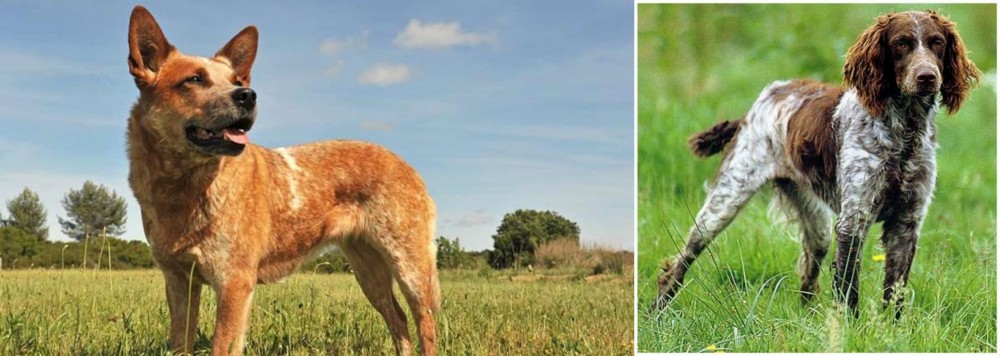 Australian Red Heeler is originated from Australia but Pont-Audemer Spaniel is originated from France. Australian Red Heeler may grow 7 cm / 2 inches shorter than Pont-Audemer Spaniel. Australian Red Heeler may weigh 11 kg / 24 pounds lesser than Pont-Audemer Spaniel. Both Australian Red Heeler and Pont-Audemer Spaniel has almost same life span. Both Australian Red Heeler and Pont-Audemer Spaniel has almost same litter size. Both Australian Red Heeler and Pont-Audemer Spaniel requires Moderate Maintenance.
Australian Red Heeler is originated from Australia but Pont-Audemer Spaniel is originated from France. Australian Red Heeler may grow 7 cm / 2 inches shorter than Pont-Audemer Spaniel. Australian Red Heeler may weigh 11 kg / 24 pounds lesser than Pont-Audemer Spaniel. Both Australian Red Heeler and Pont-Audemer Spaniel has almost same life span. Both Australian Red Heeler and Pont-Audemer Spaniel has almost same litter size. Both Australian Red Heeler and Pont-Audemer Spaniel requires Moderate Maintenance.
 When George Hall arrived in the New South Wales Colony in 1802 he set about ‘creating’ a tough working- or herding dog. By crossing Australia’s native Dingoes with Collies as well as with other herding dogs, the robust Red Heeler, also known as the Australian Cattle Dog came into being. Today he is a thick-set dog, ideally suited to working livestock.
When George Hall arrived in the New South Wales Colony in 1802 he set about ‘creating’ a tough working- or herding dog. By crossing Australia’s native Dingoes with Collies as well as with other herding dogs, the robust Red Heeler, also known as the Australian Cattle Dog came into being. Today he is a thick-set dog, ideally suited to working livestock.
Ranchers, particularly, were impressed with the breed’s toughness and they were sought after on cattle stations. The name actually comes from them when the dogs are herding animals, they nip at their heels to get them moving.
The Blue Heeler and the Red Heeler breed are the exact same dog, but just different colors. These Australian cattle dogs originated in Australia in the mid-1800s and adapted well to the harsh desert environment of the outback.
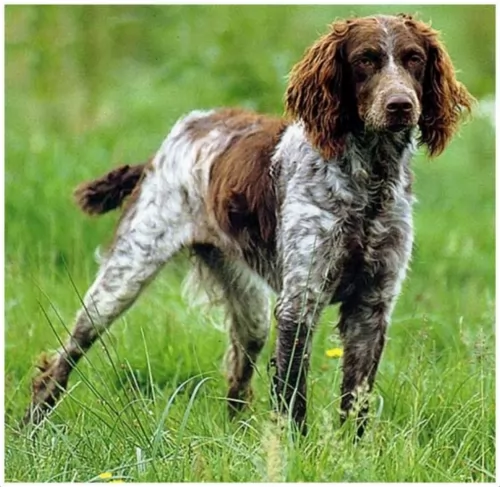 The Pont-Audemer Spaniel hails from France. The dog, known also as Epagneul Pont-Audemer is a rare breed of gun dog, and dates back to the 19th century.
The Pont-Audemer Spaniel hails from France. The dog, known also as Epagneul Pont-Audemer is a rare breed of gun dog, and dates back to the 19th century.
There aren’t clear records on the origins of the dog, but it is thought that it was developed during the 19th century. It is also thought that the dog was bred from the English Water Spaniel and the Irish Water Spaniel.
When numbers of these dogs declined, the president of the Pont-Audemer breed club permitted other breeds to be crossed with the existing gene pool. In 1980, the breed club merged with the Picardy Spaniel club and the dog is recognized by the FCI as the Pont-Audemer Spaniel.
 The Red Heeler or Australian Cattle Dog is a sturdy, muscular dog with ears that are pricked and with dark, alert eyes. The tail is long. The neck, shoulders and legs of the Red Heeler are strong and muscular. The dog is longer than tall – the length of the body is greater than the height at the withers. A well fed, well exercised, well cared for Red Heeler will weight roughly 15–22 kilograms.
The Red Heeler or Australian Cattle Dog is a sturdy, muscular dog with ears that are pricked and with dark, alert eyes. The tail is long. The neck, shoulders and legs of the Red Heeler are strong and muscular. The dog is longer than tall – the length of the body is greater than the height at the withers. A well fed, well exercised, well cared for Red Heeler will weight roughly 15–22 kilograms.
There are 2 coat colours of the Reeler – red and blue, but there are are lesser varieties such as chocolate, cream, blue mottled, brindle and some with white markings. It is interesting to note that with both the Red- and the Blue Heeler, puppies are generally born white, with the coat turning to red as they mature.
These Australian Cattle Dogs display patches of solid colour, and you might well find masks over one or both eyes and a white tip to the tail. Both the Red and Blue Heeler can have a white star on the forehead which is referred to as the Bentley Mark. The Heelers have a double coat - short, straight outer hairs while the undercoat is short, fine and dense. Despite their short coat, they shed a lot.
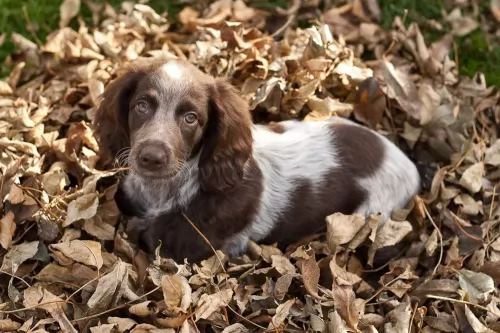 The Pont Audemer Spaniel is a medium- to large-sized breed, standing at between 50 and 58cm in height and weighing in the region of 20 – 27kg, the Pont Audemer Spaniel has a wavy, slightly curly coat of medium length, with some long hair on the top of his head. Common coat colors include white and reddish brown although there are some solid colors too. Te Muzzle of the dog is longish and fairly pointed, the nose brown and they eyes amber or hazel. This is a deep chested dog and wile the tail is traditionally docked, these days it tends to be left long and carried with a slight curve.
The Pont Audemer Spaniel is a medium- to large-sized breed, standing at between 50 and 58cm in height and weighing in the region of 20 – 27kg, the Pont Audemer Spaniel has a wavy, slightly curly coat of medium length, with some long hair on the top of his head. Common coat colors include white and reddish brown although there are some solid colors too. Te Muzzle of the dog is longish and fairly pointed, the nose brown and they eyes amber or hazel. This is a deep chested dog and wile the tail is traditionally docked, these days it tends to be left long and carried with a slight curve.
The Pont Audemer Spaniel is an intelligent dog that will respond well to training. Training and socialization are important for making him well-rounded and obedient. This spaniel-type dog just loves having loads of fun, even to the extent of being clownish.
Because he is a working dog, and an energetic one at that, he wouldn’t do well in a tiny city property but is better suited to life in the suburbs or the countryside. He is a playful dog and will get on well with children. He can also make a great friend of other dogs, particularly if he grew up with them.
 Your Australian Red Heeler needs plenty of exercise but also plenty of companionship too from his human family. He is an affectionate, playful pet but is reserved with people he doesn’t know. When socialized he is patient with children in the home but he does still have the tendency to herd them and nip at their heels. The dog builds up a strong bond with his human family, and is protective toward them, being happy to be close to his owner’s side.
Your Australian Red Heeler needs plenty of exercise but also plenty of companionship too from his human family. He is an affectionate, playful pet but is reserved with people he doesn’t know. When socialized he is patient with children in the home but he does still have the tendency to herd them and nip at their heels. The dog builds up a strong bond with his human family, and is protective toward them, being happy to be close to his owner’s side.
Red Heelers need activities and lots of room to play, and they therefore won’t adapt to apartment living. If you don’t live on a farm, don’t neglect your working dog as he will need lots of rough and tumble games and activities to keep him from boredom. Treat your Australian Red Heeler with the love, patience and kindness and you’ll bring out the very best from this active, loyal fur-friend of yours.
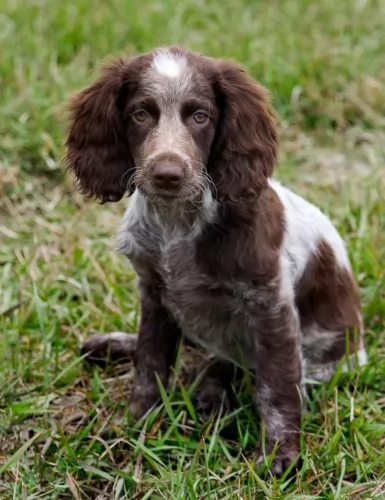 This is truly an old breed of spaniel, loving to spend time outdoors and in marshy areas.
This is truly an old breed of spaniel, loving to spend time outdoors and in marshy areas.
He is a calm, gentle breed, and passionate breeders have worked to preserve it as the dog makes a splendid pet. With an amicable look on his face which has a kind expression, he has other good characteristics to his name such as being intelligent, courageous and energetic.
Whether you’re indoors or out, the Pont-Audemer spaniel is a great companion thanks to his loyalty. Your docile, affectionate and cheerful friend will ensure you tick him off as a pet to be recommended.
 The Australian Cattle Dog is quite often affected by progressive retinal atrophy, an eye condition where the rods and cones in the retina of the eye deteriorate later in life, and it could lead to blindness. This eye illness is an autosomal recessive trait, and even if the dog doesn’t develop the condition himself, he can be a carrier of the affected gene.
The Australian Cattle Dog is quite often affected by progressive retinal atrophy, an eye condition where the rods and cones in the retina of the eye deteriorate later in life, and it could lead to blindness. This eye illness is an autosomal recessive trait, and even if the dog doesn’t develop the condition himself, he can be a carrier of the affected gene.
The Heeler is just bursting with personality and energy and a study of dogs diagnosed at veterinary colleges described fractures and ligament tears as one of the most common conditions treated with the Australian Red Heeler.
You love your Australian Red Heeler and you want to take good care of him. Check with your vet because at 8 weeks he should be starting with his first puppy vaccinations.
To keep your best friend healthy and happy, watch his diet, ensure he gets plenty of exercise, brush his teeth regularly to remove plaque build-up, and always call your veterinarian when you see he is ill and isn’t his usual boisterous self.
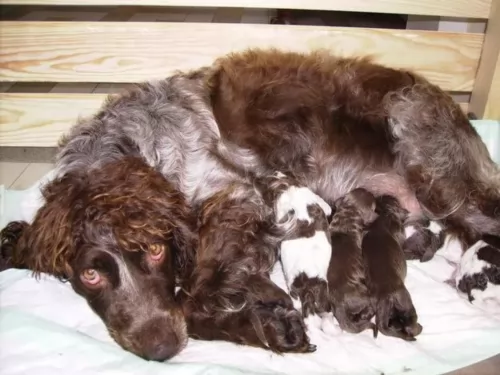 There isn’t a great deal of information on this dog as it is a fairly uncommon breed, but nonetheless a robust dog breed. He can reach 14 years or more if well cared for.
There isn’t a great deal of information on this dog as it is a fairly uncommon breed, but nonetheless a robust dog breed. He can reach 14 years or more if well cared for.
Their long, floppy ears may be a problem as dogs with long ears like this, where sunlight and air don’t reach the insides of the ear, are more prone to dampness, dirt and wax. The inside of the ears becomes a breeding place for bacteria.
It is the deep chest of the Pont-Audemer Spaniel that can put him at risk for developing bloat. When a dog like this becomes bloated you can actually see the swollen, hard stomach. The dog is extremely restless, he is panting and pacing. Immediate veterinary attention is required as this is a life threatening illness.
Known also as alopecia, there are a few things that can cause your pet to lose his hair. These can be hormonal issues or parasites such as worms.
 The Australian Red Heeler is a low maintenance dog. He does shed quite a bit so you’ll need to brush his coat at least twice a week to remove loose hairs and to keep his coat lustrous. When your dog has been in a particularly dusty area, you you wipe his coat down with a damp cloth. As with all dogs, you’ll want to check his teeth, ears, eyes and nails regularly to avoid health problems.
The Australian Red Heeler is a low maintenance dog. He does shed quite a bit so you’ll need to brush his coat at least twice a week to remove loose hairs and to keep his coat lustrous. When your dog has been in a particularly dusty area, you you wipe his coat down with a damp cloth. As with all dogs, you’ll want to check his teeth, ears, eyes and nails regularly to avoid health problems.
If you care for your working- and herding dog you’ll train him to that he becomes a good family dog and companion. The Red Heeler has plenty of energy and stamina and if he grows up untrained and un-socialized, you could see him becoming aggressive towards other animals and even your own children. He certainly becomes over-protective of his territory if not socialized. Train him as he is an intelligent breed and responds well to training.
Any vet will tell you of the critical importance of a proper diet and exercise routine for your dog. He’s an active, smart dog with loads of energy and you want to keep his diet consistent with this energy. Speak to your vet about what food would suit your pet best, because a high quality diet appropriate to his age, his body size and his energy levels will be important. Along with high quality foods which include a good intake of raw meat, your dog must always have access to a bowl of fresh, cool water.
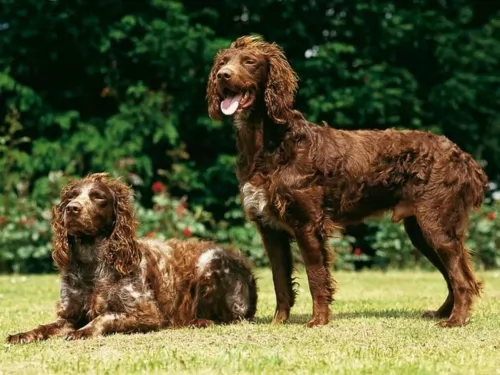 The Pont-Audemer Spaniel has always been a working breed so he is used to being active. They have high exercise requirements and will require having quite a large outdoor space to run. Ball and rope games are a must for him, lots of swimming and hikes as well as a daily walk.
The Pont-Audemer Spaniel has always been a working breed so he is used to being active. They have high exercise requirements and will require having quite a large outdoor space to run. Ball and rope games are a must for him, lots of swimming and hikes as well as a daily walk.
Even though the fairly long hair of the spaniel looks as though it may require quite a bit of upkeep, the Pont Audemer Spaniel is a low maintenance dog that will require a good brush twice a week.
While you’re brushing him, feel him over for any new, unusual lumps. Look into his eyes to make sure they’re bright and alert. Check around his ears for ticks and fleas and look inside his ears for dirt and wax which could lead to bacteria and an ear infection.
You don’t want your dog gaining weight and becoming obese as this opens up a whole lot of health issues. There are always dogs that can gain weight after they have been spayed or neutered. Remember if you’re using commercially manufactured dog food, to make sure it is high quality and also suited to your dog’s age, it’s season of life and its activity levels.
Give your canine friend some home-made food too, bearing in mind that dogs like simple, healthy food that won’t upset their stomachs, and which will be good for them too.
Boiled chicken, brown rice or pasta, sweet potatoes, carrots and spinach all chopped up can be so beneficial for your pet. If you cook it in bulk, it can be put into portions and some of this can be added into the dry kibble occasionally. This is a great treat for your dog.
Some raw meat added in from time to time can also be hugely benefit for your pet. Avoid all spicy, exotic foods for your pet.
Make sure he always has a bowl of fresh, cool water available to him.